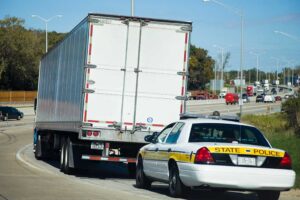In my last column, which appeared in the March 1-14, 2022, edition of The Trucker, I wrote about the rising cost of traffic tickets. Specifically, I wrote about all the extra fees that are being added to the cost of the initial fine, resulting in a greater out-of-pocket expense for drivers. Click here to review the previous column.
As I said in that column “Now, we could talk about where this additional money goes and how it is used — but let’s save that for another time. Let’s also wait to discuss how these additional financial assessments may impact the policing of drivers.”
I know many of you think I was just passing the buck and not wanting to discuss the issue at this time because I’m lazy. Well, you would be right, about the lazy part anyway.
However, the reason I didn’t dive into the subject then was that there was simply not enough space to get into the matter. Shoot, I’m not sure I can talk about it in the space I have for this column! I guess we’ll find out.
Last fall, the New York Times (NYT) wrote an article titled “The Demand for Money Behind Many Police Stops.” The article surveyed the U.S. and wrote about how revenue received from traffic citations funds town and the police responsible for finding violations.
Now before we get started, this column is NOT anti-traffic enforcement. I support the police and believe the job they provide is crucial to keeping the roads safe. I further believe that the vast majority of towns and municipalities aren’t doing anything sketchy.
With that being said, and as the NYT article noted, many municipalities across the country rely on ticket revenue and court fees to pay for government services. Moreover, some maintain “oversized” police departments whose presence helps generate that money.
Interestingly, the NYT article found that this phenomenon is not a big-city problem — instead, the majority of the towns that depend on this revenue have populations below 30,000 people. In addition, it seems many of these towns are clustered in the South and Midwest areas of the U.S.
For example, Valley Brook, Oklahoma, a town of 870 people that covers less than a half of square mile collects roughly $1 million from traffic cases. A majority of the stops occur on a four-lane road that is home to the police station, a liquor store, a cannabis dispensary and three strip clubs. According to the NYT article, 72% percent of the town’s revenues come from traffic fines; this is the highest in the state.
While it can be argued that this is because the police jurisdiction covers only one block on the main road, such enforcement allows for officers to catch more serious infractions.
“I put officers out on the street every single night for the sole purpose of drug and alcohol enforcement because it is such a big problem that we have here,” said Police Chief Michael A. Stamp. While recognizing the town’s dependence on traffic tickets, Stamp said, “I will stand by the fact that what we are doing out here also saves lives.”
With those statements in mind, it would appear that Nicholas Browser is the type of driver that the chief wants to keep off the road. Around midnight one evening, instead of pulling over for a traffic stop, Browser led police on a chase away from Valley Brook to his home about a mile away. Once he surrendered, police found a handgun and discovered that his blood-alcohol content exceeded the legal limit.
Interestingly, instead of charging Browser with a DUI — which would have resulted in the matter being transferred to district court outside of Valley Brooke — the police instead charged him with negligent driving and public intoxication, thereby allowing the town to keep the revenue.
Now understand, I’m not just picking on this one town.
The NYT articles identified towns with similar stories in Louisiana, Ohio, Oklahoma and Virginia.
According to the NYT, the federal government is partially responsible for fueling the culture of the traffic stop. The federal government issues over $600 million a year in highway safety grants that subsidize ticket writing. While no quotas are imposed in connection with these grants, at least 20 states have evaluated performance based on the number of traffic stops conducted per hour.
Now as I said earlier, I support the police and believe the job they provide is crucial to keeping the roads safe. I further believe that the vast majority of towns/municipalities aren’t doing anything sketchy.
While traffic stops and the threat of citations deter some folks from breaking the law, the need for some outlying municipalities to sustain a revenue stream could be viewed as the reason for many traffic stops occurring therein.
At the end of the day, the police are there to enforce the law and keep us safe, often from ourselves. This, and this alone, needs to be the reason for traffic stops.
While revenue from traffic citations will always be necessary to help support government services in the community, traffic citations issues solely for the purpose of revenue generation needs to stop.
Brad Klepper is president of Interstate Trucker Ltd. and is also president of Driver’s Legal Plan, which allows member drivers access to services at discounted rates. For more information, contact him at 800-333-DRIVE (3748) or interstatetrucker.com and driverslegalplan.com.
Brad Klepper is a regular contributor to The Trucker, providing valuable insights for drivers and motor carriers. He serves as president of Drivers Legal Plan, a national law firm offering discounted CDL ticket defense to members, and Interstate Trucker, a law firm providing CDL defense with no monthly fees.








